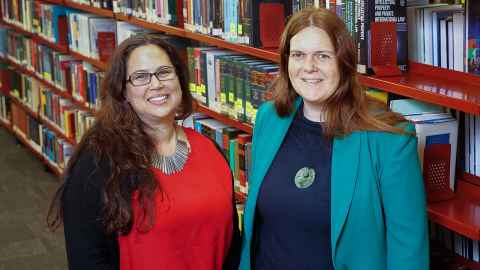Private law legacy supports legal research in Aotearoa
18 April 2024
Professor Jodi Gardner, the new Coote Chair in Private Law, is focused on taking scholarship in private law into unchartered territories.

“There is real power in Emeritus Professor Brian Coote’s name – and having it attached to my position and my research,” says Professor Jodi Gardner.
The Darwin-born, first-in-family lawyer took up the new Coote Chair in Private Law, funded by a generous bequest from the late Brian Coote, in April 2023, remotely until she and her family relocated from the University of Cambridge to Auckland in September. Her focus now is to build on the legacy established by Professor Coote – and to take scholarship in private law into unchartered territories.
Brian Coote CBE, a renowned private law expert, taught at the Auckland Law School for 33 years. His legal scholarship influenced many decisions of the House of Lords and other senior courts in the Commonwealth.
Jodi’s respect is palpable. “A legend in contract law, the excellent Brian Coote!” In another breath, she chuckles at their differences. He represented “the traditional standard orthodox private law”, whereas her research is considered “a little leftfield”.
“Brian Coote was a very doctrinal man – and the inaugural Chair has gone to a socio-legal community-focused relatively young mother of five. I think he would be quite happy to see his legacy live on and show that contract law and private law means so many different things. There is not one model of academic excellence in this area, it is an incredibly wide field.”
Jodi has her own long list of accolades. Her scholarship is an emerging mix, an intersection of private law with social welfare and geography and is very much grounded in the human experience. She has studied and worked at the University of Oxford and Cambridge, has a variety of visiting positions across the world, and is frequently asked to advise government bodies and policy institutions.
People were fighting to keep their families together, fighting for their very existence. They didn’t have the energy to take on the insurance companies – and we were there fighting for them. It was incredibly rewarding work – for me it highlighted the power of law and, in particular, the power of law – if left unchecked – to manifest and continue inequalities.
“I think that private law can learn from other disciplines – and should think about how its rules work in the lived experience of the people they apply to.”
A consumer and insurance lawyer at the time of the 2010-11 Brisbane floods, Jodi saw many traumatised communities. This focused her resolve to explore how the law could be used to stand up for and protect the people who are most vulnerable.
“People were fighting to keep their families together, fighting for their very existence. They didn’t have the energy to take on the insurance companies – and we were there fighting for them. It was incredibly rewarding work – for me it highlighted the power of law and, in particular, the power of law – if left unchecked – to manifest and continue inequalities.”
Jodi’s current research looks beyond the expectation for the Government to solve poverty.
“Ensuring everyone has the bare minimum level of resources is often thought of as a government obligation. That misses a big part of the story – which is how our private law structures are set up, and how, often, they exacerbate existing inequalities and vulnerabilities. Different mechanisms in our private law are meant to apply equally. In reality, they punish the people who are most vulnerable. In my research, I am looking for how private law can respond to these issues.”
“I’ve also just started an empirical research project on class action lawsuits and litigation funding with some colleagues in Australia. It is a similar area to the work being undertaken by Nikki Chamberlain, a fabulous senior lecturer at University of Auckland, and I look forward to working with her in the future.”
“Class actions provide a fantastic hypothetical way to get legal redress and assert legal rights without individually paying for the entire costs of legal action. There is real potential to do good, to champion access to justice and to respond to inequalities. The other side is that there hasn’t been much work from the consumer’s perspective, whether they understand their rights and obligations, the costs involved and what they are giving up by being part of the class action.”
Looking ahead, Jodi is very much looking forward to helping to foster the next generation of private lawyers. She hopes to inject more pro bono, clinical legal education, and practical legal training into the curriculum here in Auckland.
“Understanding the law in the lectures and textbooks is valuable – but often that doesn’t reflect the law that is on the ground in everyday life. A clinical legal education and pro bono work gives an invaluable opportunity to see how the law works, in practice. I think it makes a more well-rounded, empathetic law graduate.”
Jodi was eager to teach a summer intensive on consumer law, followed by torts in the 2024 year. She has already taken on supervision of doctoral candidates with an array of research projects at Auckland looking at class actions, consumer protection and the intersection with marketing, Chinese contract law and intertrade disputes.
“The intersection of private law will become an increasingly important area as society seeks to find ways to tackle poverty and inequality beyond direct government support and sees what other institutions and what other mechanisms can be used to try and make New Zealand as fair a place as possible.”
Media contact
Helen Borne | Communications and Marketing Manager
Alumni Relations and Development
Email: h.borne@auckland.ac.nz